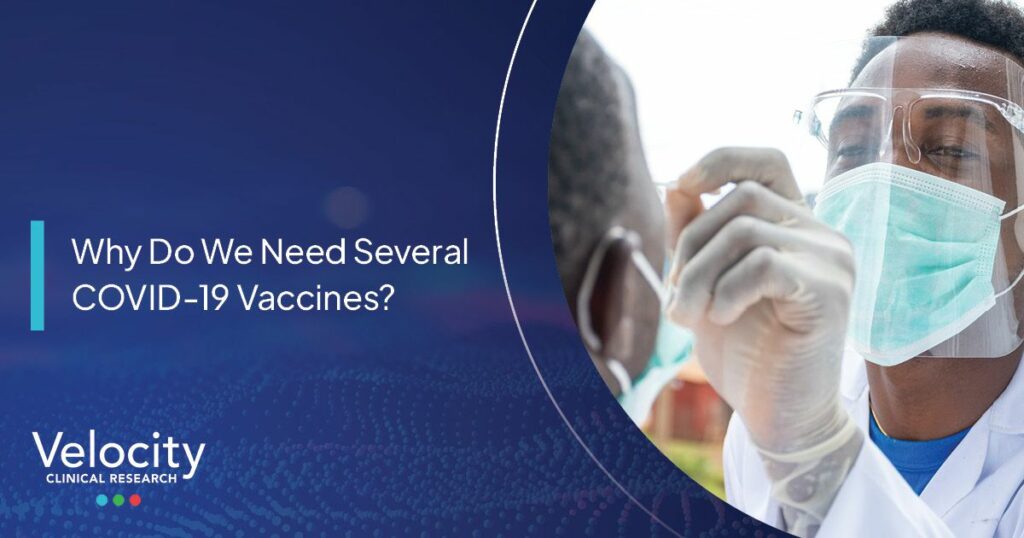Throughout the COVID-19 pandemic, you’ve likely heard news outlets and government officials refer to ‘the vaccine,’ or imply that scientists are all working on the same vaccine. In truth, many companies are developing many different COVID-19 vaccines.
The goal is to identify the safest, most effective way to stop COVID-19. This may actually require several different vaccines. You may be surprised to learn that producing several vaccines for one virus happens often. There are several reasons for this.
A Different Vaccine for the Same Virus? It Happens Every Year…
Did you know there are actually several influenza vaccines approved for use, and that many companies are still researching and developing new flu vaccines each year?
Flu shots may differ year to year to help stop the most common strains of influenza. Likewise, your age or health status may affect which flu shot you’re given. For example, an infant getting their first flu shot may actually need another ‘booster’ shot 4 weeks later; on the other hand, a 65-year-old person may get a flu vaccine that is many times ‘stronger’ to help their body prompt a strong immune response.
While it may seem odd that we’d need different vaccines to stop COVID-19, it’s already the approach we take with the yearly flu shots.
Our Eggs Aren’t All in One Basket
At the beginning of the COVID-19 pandemic, scientists began studying potential vaccines in laboratories (in vivo). Different companies selected different vaccine platforms based on their capabilities and proprietary research.
At the start of the pandemic, no one knew what would work the best. Preclinical and clinical testing helped scientists determine what — and how many — dosages would be necessary to safely prompt an immune response. Several approaches may prove to be effective.
You’ve likely heard of Pfizer/BioNTech and Moderna recently. Each company has a very promising COVID-19 vaccine candidate with positive clinical trial data. Some companies (including Pfizer/BioNTech and Moderna) are developing mRNA vaccines for COVID-19, while others are researching viral vector and recombinant protein vaccines.
Several approaches are showing encouraging data. That’s good because…
We’re Facing Supply and Distribution Limits
Even if one, two, or more COVID-19 vaccines are approved, it may be difficult to vaccinate everyone who wants the vaccine. Simply put, only so many approved vaccines can be manufactured and delivered at once.
At-risk groups, like healthcare workers, care home residents, and seniors with underling conditions may be the first to get a vaccine out of necessity. The general population may have to wait months longer.
Because COVID-19 is so contagious, the disease will still be able to spread among vulnerable populations until enough people acquire immunity.
If more companies can get a vaccine approved and manufactured, more people will be able to get vaccinated faster.
Different Vaccines or Treatments May be Safer and/or More Effective for Certain People
If you do get a COVID-19 vaccine, it may be one best suited for your age, ethnicity, and health status.
For example, several vaccines may get approved for use in the U.S. If this is the case, one vaccine may be safer and more effective for a healthy, 45-year-old African American, whereas another vaccine may be safer and more effective for a 70-year-old Caucasian with heart disease.
This is why enrolling a diverse mix of patients has been such a critical part of the COVID-19 vaccine clinical trials. Scientists need to study how people of differing ages, ethnicities and chronic conditions (e.g., diabetes, heart disease, asthma, allergies, etc.) responded to the vaccines.
You Can Still Help by Joining a Clinical Trial
Velocity is still conducting clinical trials for numerous investigational COVID-19 vaccines. If you participate, you may receive an investigational vaccine (or placebo) and be compensated for your time.
To learn more and see if you’re eligible for a study near you, sign up at velocityclinicaltrials.com.

